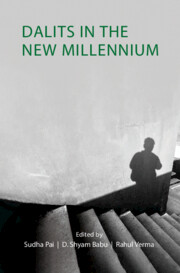Book contents
- Frontmatter
- Contents
- List of Figures
- List of Tables
- Acknowledgements
- 1 Introduction: Dalit Discourse in the New Millennium
- Part I Shifting Patterns of Electoral Politics
- Part II Popular Culture, Discourse, and Protest
- Part III Transformations in Ideology and Identity
- 11 Annihilation, Identity, Representation: Kanshi Ram and the Conundrums of Dalit Political Agency
- 12 Reading Caste and Class Together: A Dalit–Bahujan–Left Alliance?
- 13 Towards Radical Democracy: The Dalit–Bahujan Claim for Political Power
- 14 Liberation Panthers and the Dalit Challenge to Hindutva in Tamil Nadu
- 15 Dalit–Bahujan Politics: Crisis and Future
- Part IV Aspirations and Anxieties
- Part V Discrimination and Representation
- About the Contributors
- Index
14 - Liberation Panthers and the Dalit Challenge to Hindutva in Tamil Nadu
from Part III - Transformations in Ideology and Identity
Published online by Cambridge University Press: 12 July 2023
- Frontmatter
- Contents
- List of Figures
- List of Tables
- Acknowledgements
- 1 Introduction: Dalit Discourse in the New Millennium
- Part I Shifting Patterns of Electoral Politics
- Part II Popular Culture, Discourse, and Protest
- Part III Transformations in Ideology and Identity
- 11 Annihilation, Identity, Representation: Kanshi Ram and the Conundrums of Dalit Political Agency
- 12 Reading Caste and Class Together: A Dalit–Bahujan–Left Alliance?
- 13 Towards Radical Democracy: The Dalit–Bahujan Claim for Political Power
- 14 Liberation Panthers and the Dalit Challenge to Hindutva in Tamil Nadu
- 15 Dalit–Bahujan Politics: Crisis and Future
- Part IV Aspirations and Anxieties
- Part V Discrimination and Representation
- About the Contributors
- Index
Summary
On 27 September 2020, a small group called the European Periyar Ambedkar Comrades’ Federation organized a webinar on ‘Periyar and Indian Politics’. The address was delivered by Thol. Thirumavalavan, the leader of the Viduthalai Chiruthaigal Katchi (VCK, or Liberation Panther Party), the largest Dalit-led party in Tamil Nadu, and he focused on Periyar's feminism. In the lecture, Thirumavalavan outlined why Periyar had attacked Hindu scriptures: ‘As per Hindu Dharma, all women are created by God as prostitutes. They are prostitutes as per Hindu Dharma … Manu Dharma. The status of all women is less than that of a man.’ In so doing, Thirumavalavan was following in the footsteps of Periyar, Ambedkar, and others in highlighting the ideological underpinnings of ‘Brahminical patriarchy’ (Chakravarti, 1993). A video clip of these comments, however, was seized upon and widely circulated by Hindu-right groups in Tamil Nadu, especially the Bharatiya Janata Party (BJP), which accused Thirumavalavan of calling all women prostitutes. They filed a case against him, called for his arrest, and sought to organize protests to condemn his remarks. Faced by this onslaught, Thirumavalavan doubled down on his comments and demanded a ban on the Manusmriti instead.
What is this party which has aroused the ire of the BJP? The VCK emerged as a radical Dalit movement fighting caste inequality, but it has consistently rallied under the slogan of uprooting Hindutva. Their opposition to the Rashtriya Swayamsevak Sangh (RSS) dates back to L. K. Advani's infamous rath yatra in the early 1990s, the inflammatory dangers of which the Dalit Panthers compared to Hanuman setting fire to Lanka and against which they organized cycle rallies and poster campaigns. The party has never had more than four members of the legislative assembly (MLAs) or two members of the parliament (MPs) at one time, does not have a recognized symbol yet, and has always contested elections in alliance with larger and more established allies. Despite this, it is regularly singled out for attacks by the BJP–RSS in Tamil Nadu and remains a thorn in the side of Hindutva.
- Type
- Chapter
- Information
- Dalits in the New Millennium , pp. 247 - 266Publisher: Cambridge University PressPrint publication year: 2023

